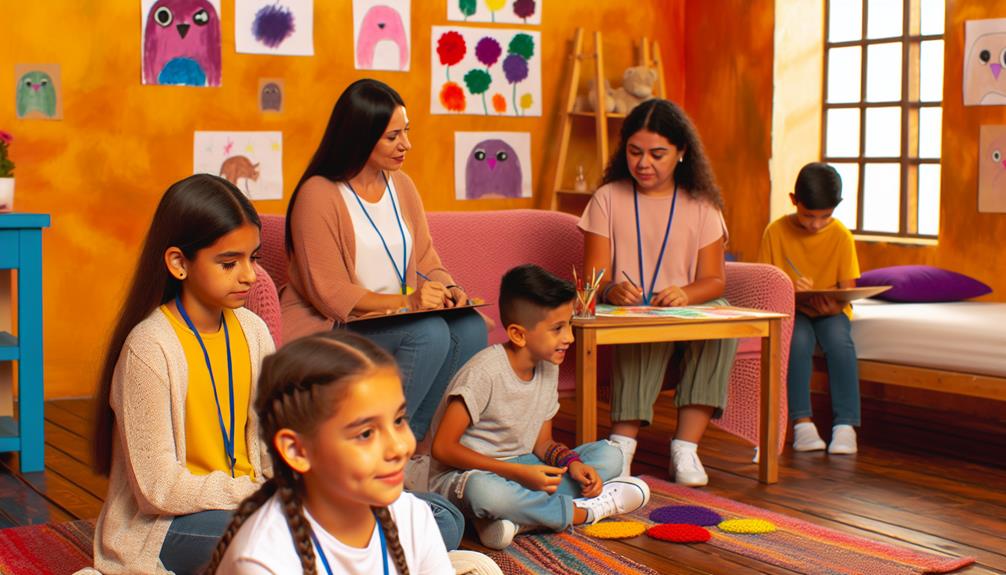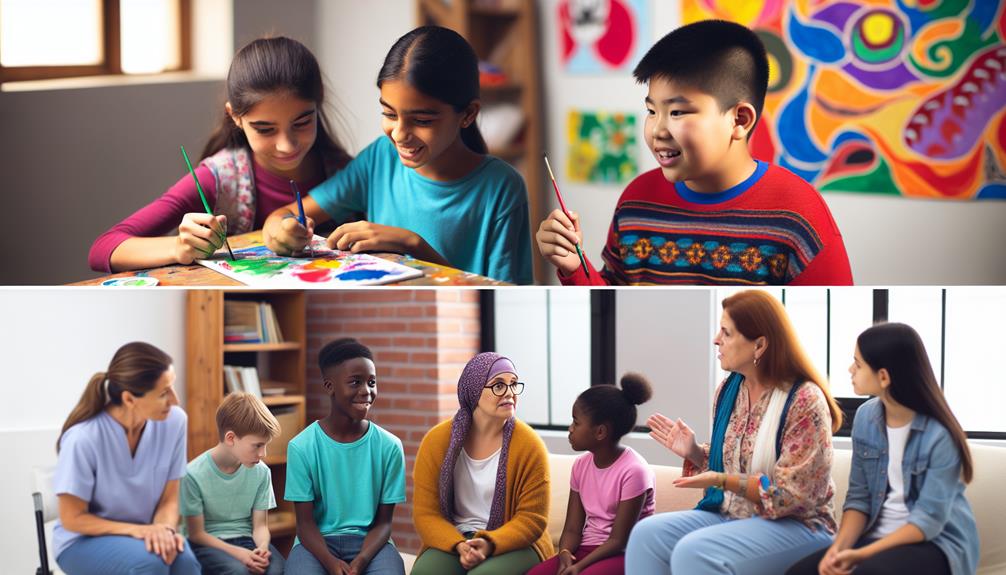'Foster care children often need specific support to navigate life's challenges. Three pivotal services are emotional support, therapy services, and educational assistance. Emotional support enables them to develop emotional intelligence and manage their feelings, while therapeutic services help them process their experiences and build coping mechanisms. Additionally, educational assistance guarantees they're prepared for academic pursuits, fostering self-confidence and intellectual growth. By discovering more, you'll understand how these services cultivate resilience and optimism, equipping these children for a brighter future.'
Key Takeaways
- Emotional support involves providing a safe, nurturing environment and tools for managing emotions effectively.
- Therapy services help foster children process emotions, develop coping mechanisms, and build healthy relationships.
- Educational assistance includes tutoring, mentorship, and support in transitioning to new academic environments.
- Physical health support ensures a balanced diet, regular medical check-ups, and promotes regular physical activity.
- Aftercare support and independent living preparation equip foster children with life skills, career insights, and strategies for successful independence.
Understanding Foster Care System

To truly grasp the complexities of supporting foster care children, you first need to understand how the foster care system works. It's a legal structure designed to provide temporary or permanent homes for children who can't live safely with their biological families. Maneuvering this system can be challenging, especially when you're confronted with numerous foster care myths that cloud your understanding.
Let's debunk some of these myths. You might think foster care is a last resort, but it's often the first safe place for many children. Another common misconception is that it's only for 'bad' kids. This isn't reality; children end up in foster care due to situations beyond their control, not because of their behavior.
Legal aspects play a significant role in the foster care system. Laws help protect the rights and safety of children, including the right to education, healthcare, and freedom from abuse or neglect. Understanding these laws is vital, as they guide every decision about a child's placement, care, and future.
Importance of Emotional Support
While understanding the legalities of the foster care system is certainly important, let's not overlook the immense value of emotional support for these children. Emotional support plays an essential role in their emotional intelligence development, enabling them to identify, use, understand, and manage their emotions in a healthy way. This fosters a sense of security and helps them build strong relationships, enhancing their overall wellbeing.
Being placed into foster care can be a traumatic experience. Therefore, implementing trauma-informed care is critical. This approach recognizes the presence of trauma symptoms and acknowledges the role that trauma has played in their lives. It ensures that the care provided avoids re-traumatization and promotes healing.
Foster children need to know they're not alone and that their feelings matter. As a caregiver or professional, your role is key in providing this emotional support. By understanding their needs, being patient, and creating a safe, loving environment, you can help them navigate through their emotions and experiences. This isn't just about making them feel better momentarily, but about equipping them with emotional tools for life. Remember, your support can make a world of difference to a foster child's life.
Therapy Services for Foster Children

In your role as a foster parent, you'll find that therapy services can be an essential part of a child's journey towards emotional stability and overall wellbeing. Understanding the benefits of therapy and how to select the most appropriate therapist can make a significant difference.
Let's look at how therapy can aid foster children and how to identify a therapist that can meet their unique needs.
Benefits of Therapy
Traversing the emotional landscape of foster care can be challenging, but therapy services offer a beacon of hope, providing substantial benefits to foster children.
Therapeutic art and play therapy, in particular, can be powerful tools in helping children process their emotions. They're not just playing or creating art, they're expressing themselves, uncovering feelings and experiences that are often too significant or painful to put into words. These types of therapy can foster resilience, enhance emotional well-being, and promote personal growth.
Therapy can also help children develop coping mechanisms, improve their self-esteem, and build healthy relationships. So, don't underestimate the power of therapy. It's a vital support service that can truly transform the lives of foster children.
Selecting Appropriate Therapists
Choosing the right therapist for a foster child isn't just about their qualifications, it's about finding a professional who can truly connect with the child and understand their unique needs.
When selecting the right therapist, consider these four important factors:
- Experience: Look for therapists with experience in working with foster children.
- Cultural Sensitivity: The therapist must respect and understand the child's cultural background.
- Trauma-Informed Care: The therapist should be trained in trauma-informed care to help the child cope with past adversities.
- Connection: Above all, the therapist and child should have a good rapport.
Educational Assistance Programmes
Numerous educational assistance programs are available to make sure you, as a foster child, aren't left behind in your academic journey. These programs, aimed at boosting your School Readiness and Extracurricular Involvement, guarantee you have every opportunity to thrive academically.
| School Readiness Programs | Extracurricular Involvement |
|---|---|
| Provide tutoring, learning resources, and mentorship to make certain you are academically prepared for school | Offer access to sports, arts, and club activities that contribute to your overall development and social skills |
| Assist in guiding the enrolment process, helping you smoothly shift into new academic environments | Help you explore and cultivate your talents, fostering a sense of identity and achievement |
These programs, whether they're assisting you in getting ready for school or encouraging your participation in extracurricular activities, are designed with your best interests in mind. They're there to support you, to guide you, and to provide a solid foundation for your educational pursuits. As a foster child, your journey may be challenging, but remember, you're not alone. These educational assistance programs are your allies, dedicated to making sure you have the tools and support needed to excel.
Physical Health in Foster Care

While focusing on your academic journey is important, it's equally essential to pay attention to your physical health as a foster child. Your body's well-being directly impacts your ability to concentrate, learn, and perform at your best. So, let's talk about some key aspects of physical health that you need to prioritize.
- Nutritional Needs: Proper nutrition is essential. You require a balanced diet loaded with vitamins, minerals, and proteins to support your growth and development. Don't skip meals and try to limit junk food.
- Exercise Programs: Regular physical activity leads to both physical and emotional well-being. Whether it's team sports, running, or yoga, find an exercise program that you enjoy and stick to it.
- Regular Check-ups: Regular medical appointments are crucial to detect any potential health issues early. Don't hesitate to communicate any concerns or discomfort to your healthcare provider.
- Adequate Rest: Getting enough sleep is vital for your body to recover and rejuvenate. Aim for at least 8 hours every night.
The Role of Social Workers
Understanding the foster care system may often seem overwhelming, but social workers play a pivotal role in guiding you through this process, acting as your advocates and support system. They're equipped with cultural competency training – knowledge and skills to understand, appreciate, and interact with people from cultures or belief systems different from theirs. This guarantees that your child's unique cultural needs are met and respected.
Social workers are also engaged in advocacy initiatives. They fight for your child's rights, making sure they receive appropriate services and opportunities. They're the intermediaries between you, the foster parents, and the various agencies involved in foster care. They help you navigate the system, working tirelessly to resolve any challenges that may arise.
Moreover, social workers provide emotional support and counselling, helping you and your child cope with the changes and challenges of foster care. Their role goes beyond administration – they're dedicated to making the foster care journey as smooth and supportive as possible for everyone involved.
Community-Based Support Services

In addition to the support from social workers, you'll find a wealth of resources in community-based services designed to assist foster care children and their families. These services are typically provided by nonprofits, religious organizations, and local government agencies. They understand the unique challenges you face and aim to equip you with the tools and resources you need to thrive.
- Peer Mentoring Programs: These programs connect foster care children with trained mentors who've had similar experiences. The mentors provide guidance, support, and serve as positive role models.
- Cultural Competency Training: This training helps foster parents understand and respect the diverse backgrounds of the children they care for. It promotes inclusivity and ensures the child's cultural needs are met.
- Support Groups: Here, you'll find a safe space to share your experiences, learn from others in similar situations, and gain emotional support.
- Educational and Skill Development Programs: These programs offer tutoring, job training, and life skills classes to foster care children to make sure they're prepared for adulthood.
Community-based support services are essential to the wellbeing and success of foster care children and their families. They provide a network of care that extends beyond the traditional supports, making sure you're never alone in your journey.
Financial Support for Foster Families
Understanding the financial aspects of foster care can be overwhelming, but rest assured, there are numerous grants, subsidies, and other forms of financial assistance available to help ease the burden. These financial support mechanisms are designed to cater to the unique needs of foster families, making sure that you can provide the best possible care for your foster child.
Tax benefits exploration is a crucial part of this financial journey. It mightn't be the most exciting task, but it can greatly enhance your financial standing. As a foster parent, you're likely eligible for certain tax benefits and deductions, which can help offset the costs of caring for a child. It's advisable to consult with a tax professional to fully grasp these benefits and how to claim them.
Another financial aspect to contemplate is the adoption process. If you're thinking about adopting your foster child, be aware that there are adoption assistance programs available. These programs can help cover the costs associated with adoption, such as legal fees, home study costs, and post-adoption services. Adoption, while a beautiful journey, does come with financial considerations. Being prepared and informed will ensure that money doesn't stand in the way of providing a loving home for a child in need.
Transitioning Out of Foster Care

As you approach the end of your time in foster care, the shift can be intimidating. Don't worry, you're not alone.
There are aftercare support services and preparation programs for independent living that can help you navigate through this crucial stage with confidence and ease.
Aftercare Support Services
Every young adult moving out of foster care deserves access to thorough aftercare support services, designed to ease this significant shift and set them up for future success. This support should ideally encompass:
- Crisis Intervention Strategies: Providing immediate assistance and support during emotionally taxing situations, to help stabilize the individual.
- Peer Mentoring Programs: Facilitating interactions with individuals who've successfully navigated the shift out of foster care.
- Career Guidance: Offering job training, resume building, and interview preparation services.
- Healthcare Assistance: Ensuring access to physical and mental health services, essential for their overall well-being.
Mastering the shift out of foster care could be challenging, but with these aftercare support services, you're not alone. Your progression towards independence is our shared goal.
Independent Living Preparation
Starting on your journey to independence after leaving foster care can feel overwhelming, but with the appropriate preparation and support, it's a change you can master confidently. A crucial component of your shift plan should involve Independent Living Preparation. This approach focuses on life skills training and vocational guidance to equip you with the necessary tools for a successful change.
Life skills training might involve practicalities like budgeting, cooking, and self-care. On the other hand, vocational guidance provides insights into career paths, job search strategies, and interview techniques. With these knowledge and skills, you're not just surviving on your own, but thriving.
Frequently Asked Questions
What Are Some Common Misconceptions About Children in Foster Care?
You often encounter stigma stereotypes and foster care myths, like the idea that all foster kids are troublemakers or unadoptable. These misconceptions can be damaging and don't reflect the diverse experiences of these children.
Do Foster Children Have Any Legal Rights to Access Their Biological Family?
Yes, foster children do have rights to access their biological family. Legal advocacy and family reunification services play critical roles in upholding these rights, ensuring you maintain connections with your birth family when possible.
How Can Foster Parents Be Better Trained to Handle Behavioral Issues of Foster Children?
You can enhance your training by learning Trauma Informed Care and Positive Discipline Strategies. They'll help you understand and manage foster kids' behaviors, reflecting their past traumas and building a nurturing environment respectively.
What Is the Role of the Biological Parents in the Life of a Foster Child?
You, as biological parents, play a vital role in your child's life. Your influence greatly impacts their development. You're also integral to the reunification process, should circumstances permit a safe and healthy return home.
Are There Any Programs or Initiatives That Help Foster Children Connect With Their Cultural Roots?
Yes, there are. You'll find Cultural Identity Exploration initiatives and Heritage Embracement Programs designed to help foster children connect with their cultural roots, enhancing their sense of identity and self-esteem.
Conclusion
To wrap up, keep in mind that over 23,000 foster kids age out of the system each year without support. So, as a community, let's enhance these essential services.
Emotional help, academic assistance, and physical health care are critical for their development. Social workers, community services, and financial aid play a significant role in shaping their future.
It's our collective responsibility to guarantee these children move out of foster care with a strong foundation for a successful life.




